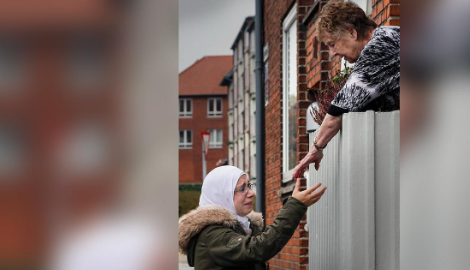After fearing death from the Syrian regime, and surviving desert marches and three days at sea on the migrant trail, Asmaa al-Natour thought she had found safety in Denmark.
Now she is among hundreds of Syrians who have been told it is safe to return home, despite the continuing arrests, torture and killings of those considered suspect by President Assad’s security services.
A photograph of her saying goodbye to her Danish neighbour as she was taken away to a deportation camp last week has made her a test case for the country’s controversial policy on refugees. “My neighbour was so sad she grabbed my hands and asked me not to leave,” Natour told The Times after the photograph was seen in newspapers and online around the world.
“She asked the journalists who were present, ‘Where are they going to send her? To Syria, which is not safe? To Bashar al-Assad, the criminal? I cried. We had a lovely life in the town, everyone was so loving.”
Natour and her family have lived in Ringsted, west of Copenhagen, for seven years. They fled Syria first on a flight to Algeria, then across the desert into Libya and over the Mediterranean to Italy. From there she moved to Denmark, where her son had already sought asylum.
She and her husband started their own business and were no longer in receipt of Danish aid money. They learnt Danish, paid their taxes and made friends, Natour said.
Denmark is the first European country to deem parts of Syria safe for refugees to return to, and has begun sending residents of Damascus such as Natour to detention camps to await deportation.
Natour is now in the Kaershovedgard camp. “We had an email to go visit the repatriation office, where they spent four hours trying to convince us to voluntarily go back home, with an offer of payment of 144,000 krone [£16,500] each,” she said. “The decision was made against me and my husband only because our children have political asylum.”
She said that the camp’s residents were “scared and tired”. “The toilets are so filthy that I cannot even touch the walls,” she said. “The camp is very old and lacks the basic life requirements like cleanliness.”
Last month a report by Human Rights Watch detailed arbitrary arrests, torture, disappearances and extrajudicial killings of Syrian refugees who returned to Syria from Jordan and Lebanon.
The rights group described Denmark’s move as a “dangerous precedent” for the European Union, where more than a million Syrian refugees have sought shelter. The Danish authorities say that Damascus and its surrounding province are no longer dangerous enough to justify offering refugees from there the right to remain in Denmark.
Natour says she and her husband are particularly at risk because he left his job in a government ministry unofficially and fled. “Most of my family are wanted, and many have been killed already,” she said. “Now that our story has gone viral I think we are in even greater danger.”
Alysia Alexandra, a Danish activist who has been tracking the cases of Syrian refugees denied residency, said that the government was driven by anti-refugee sentiment. “The decision to revoke residencies is catering to the far right with the plan of having a zero refugee policy in the coming years,” she said.
“The far right has misrepresented data and demonised Syrian refugees so there is support in Danish society to send the refugees back. But there have also been large initiatives to fight this decision.”
One Syrian man died of a heart attack after his residency was withdrawn and he was informed that he would be deported to Syria. Many Syrian students have been caught in limbo.
Deportations cannot happen yet because Denmark does not have diplomatic ties with the Syrian government. Alexandra said that the camps were partly intended to make life so uncomfortable for refugees that they would leave voluntarily.
There are signs that Denmark’s example is being watched closely by its neighbours. Germany has been among the most vocal advocates of continued sanctions on the Assad regime but it has partially lifted its own ban on deportations, to allow it to return refugees with criminal convictions. At least nine of the sixteen federal states in Germany want Syrians to leave, according to reports in German media.
Natour says that she is among many Syrians who have rebuilt their lives from scratch in Europe but now fear they will be uprooted yet again, with nowhere to go.
“Going back to Syria is immediate execution for me because I am wanted,” she said. “But staying here in the camp is slow death.”








































admin in: How the Muslim Brotherhood betrayed Saudi Arabia?
Great article with insight ...
https://www.viagrapascherfr.com/achat-sildenafil-pfizer-tarif/ in: Cross-region cooperation between anti-terrorism agencies needed
Hello there, just became aware of your blog through Google, and found ...